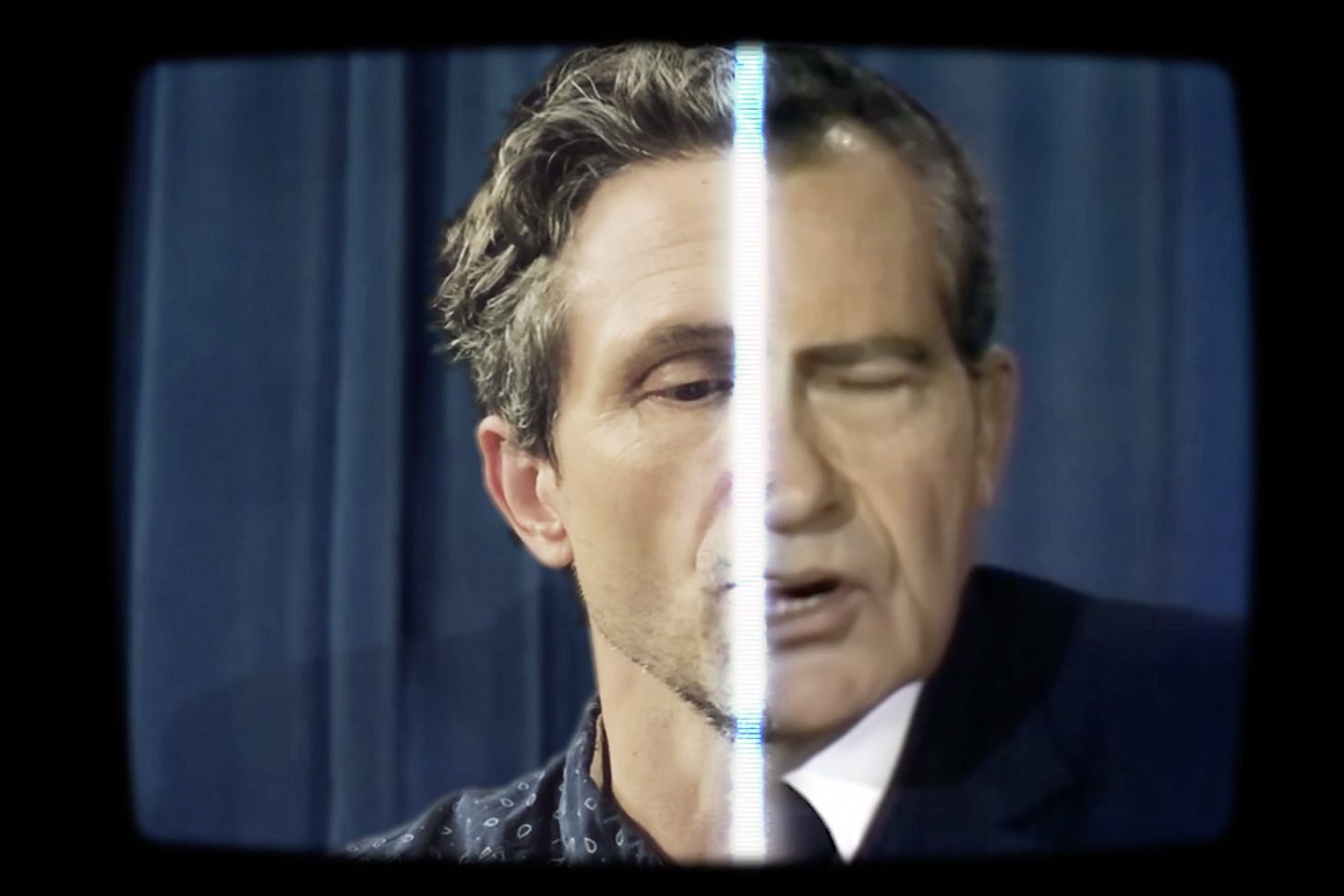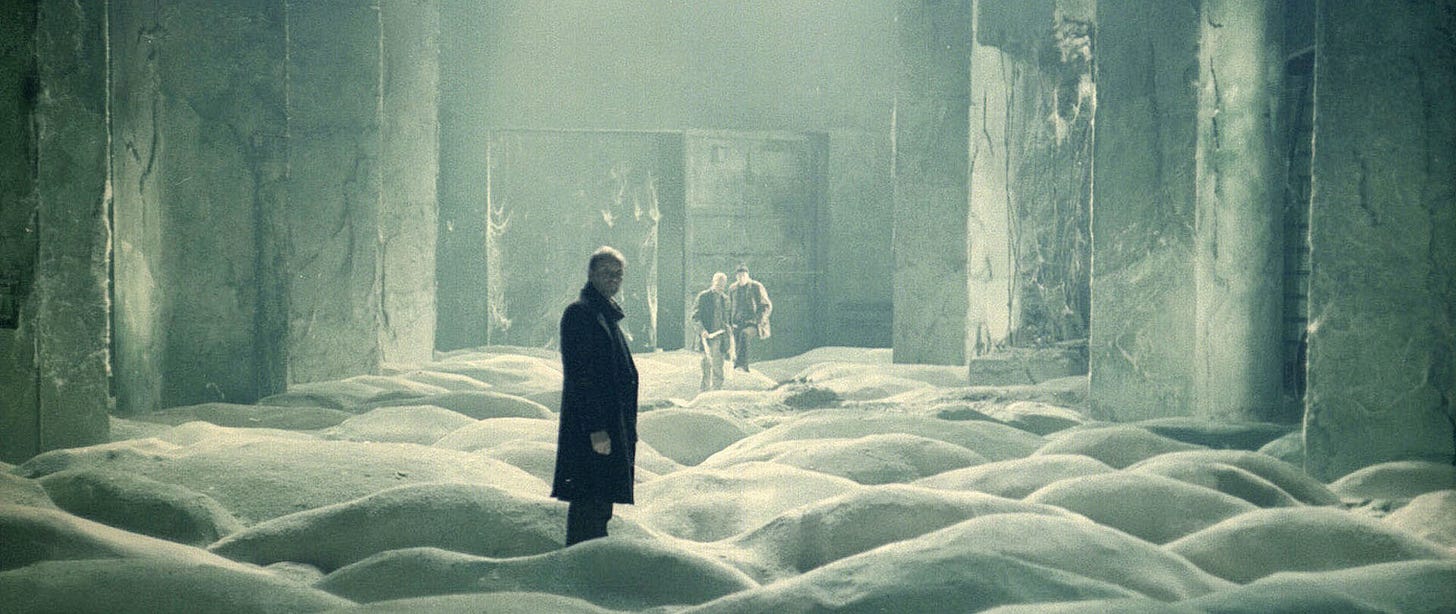Dear Barney,
Great to see you on NYE! Hope 2023 is treating you swimmingly so far
The other day I was thinking about you taking a week off to watch the World Cup and wondering if you’ve ever come across Borges’ little 1967 fable Esse Est Percipi? Basically, the narrator Don Domecq wants to find out what happened to a football stadium that seems to be missing from its usual location, and he ends up speaking to Tulio Savastano, president of a club that Google Translate calls ‘Asbestos Juniors’.
Domecq is shocked when, in mine and Google’s crude translation, Savastano tells him:
‘The last football match was played in the capital on June 24 of ‘37. From that precise moment, football, like a vast range of sports, became a dramatic genre, performed by a single man in a booth or by actors wearing T-shirts before the cameraman.’
‘Lord, who invented these things?’ I managed to ask.
‘Nobody knows. Mass advertising is the conquistador of modern times.’
‘And the conquest of space?’ I moaned.
‘It's a foreign program, a Yankee-Soviet co-production. A laudable advance, let's not take away from the scientific show.’
‘President, you scare me,’ I mumbled, without respecting his superior status. ‘So in the world nothing happens?’
‘Very little,’ he answered with his English phlegm.
Obviously, history is, in a sense, always airbrushed by the person documenting it. Joseph Stalin understood this all too well when he cut people out of photographs during his Great Purge: if you alter the image, you change history. You wrote about this, didn’t you? Not Stalin, but the media’s (newspapers’?) role in writing history? I’m so rude for forgetting!
Concerned about recent advances in synthesised media and an epidemic of misinformation, a team from MIT’s Centre for Advanced Virtuality produced a fascinating work of science fiction ‘In Event of Moon Disaster’.
Synthesising Richard Nixon’s face and voice, he addresses the nation following 1969’s ‘failed’ moon landing. What’s neat is that the speech itself is real. Although it was never broadcast, William Safire wrote it as a contingency, had history taken a different path.
‘Fate has ordained that the men who went to the moon to explore in peace will stay to rest in peace,’ Nixon’s likeness says to camera. ‘For every human being who looks up at the moon in the nights to come will know that there is some corner of another world that is forever mankind.’
If Neil Armstrong and Buzz Aldrin had been stranded on the moon, this is a speech we might all know by rote. Safire looked to a poet for inspiration, borrowing from Rupert Brooke, who died in World War I. The poem is ‘The Soldier’:
If I should die, think only this of me:
That there’s some corner of a foreign field
That is for ever England.On it goes, ‘A body of England’s, breathing English air,’ — i think the speaker might be English?
Putting aside the poem’s patriotism (unappetising in Born-in-Carlisle-Made-in-the-Royal-Navy Britain) do you think that in times of disaster there are certain rhythmic structures that make everybody feel safe? Is it just because the cadence sounds old-fashioned and therefore (paradoxically) signals that it has withstood the test of time like sturdy *English* oak, or is there something more intuitive, more musical going on? (Maybe the successive stresses in ‘there’s some corner’, which interrupts the iambic pentameter, makes us sit up slightly and underscores the sense of vague hopefulness? idk)-
⚒️ CHOOSE YOUR OWN SIGN OFF
⛏️ A)
As much as ‘In Event of Moon Disaster’ is about the very real political threat of deepfakes, at the same time it demonstrates synthesised media’s artistic potential. Personally, I can’t wait for the days where I’m laid out on the beach while my avatar turns up to Zoom meetings for me.
PEACE
Godot x
⛏️ B)
It took me a while to figure out how to end this letter. In itself, that’s very telling. I spent years trying and failing to write a novel. The trouble was it didn’t go anywhere. Virtual games, simulated speeches — weeks have passed and it seems so obvious that these are synonyms (symptoms) for fiction. The moon landing could have failed or succeeded; not knowing the right path to take, the *best* causes for the *greatest* effects, I stall at the intersection. All my stories and letters go sideways. Remember that clip from Zona?
Maybe by going to the Zone he’ll be rejuvenated. Man, I know how he feels. I could do with a piece of that action myself. I mean, do you think I would be spending my time summarising the action of a film almost devoid of action—not frame by frame, perhaps, but certainly take by take—if I was capable of writing anything else?
So funny! So close to the bone.
Look forward to seeing ya soon
Sammi
x
⛏️ C)
Fade to black.
⛏️ D)
Just before halftime, the Asbestos Juniors ‘players’ seemed to be moving in slow motion, and the commentators' voices became distorted. Rachel rubbed her eyes, thinking it was just a glitch in the broadcast, but when she looked back at the screen, the players were gone, and in their place was a desolate lunar landscape. Rachel recognised it immediately — it was the same footage of the failed moon landings of 1969 that she had seen countless times before. But this time, the voice of President Nixon filled her living room.
‘Fate has ordained that the men who went to the moon to explore in peace will stay to rest in peace,’ Nixon said gravely. ‘It seems that the moon is not as lifeless as we expected.’
⚒️ What does Rachel do next?
……….
Much love and see you soon
Godot x










I’d been hoping this newsletter would take a Goosebumps twist 🧟♂️